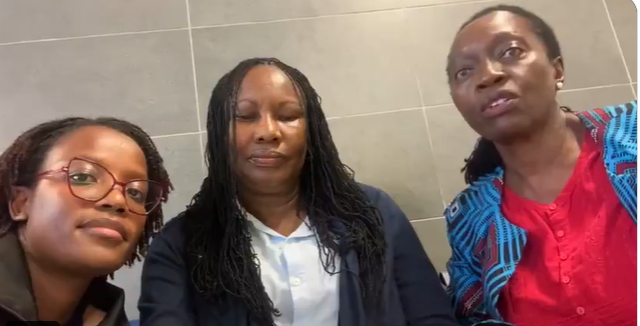
 PLP leader Martha Karua and other lawyers at the Julius Nyerere airport on May 18, 2025. PHOTO/Screengrab
PLP leader Martha Karua and other lawyers at the Julius Nyerere airport on May 18, 2025. PHOTO/ScreengrabThe move has forced civil society organisations, legal experts, and regional human rights defenders to join hands in condemning the actions as an infringement on freedom of expression, the right to association, and regional solidarity.
“The deportation of the three East Africans is a breach not only of regional law but of basic principles of fairness and openness in judicial proceedings,” Pan African Lawyers Union (PALU) CEO Donald Deya said in a statement.
He stated: “The right to observe public criminal trials is enshrined in the African Charter on Human and Peoples’ Rights.”
Among those barred or detained are PLP party leader Martha Karua, former Chief Justice Willy Mutunga, activists Lyn Nguni, Hussein Khalid Boniface Mwangi, and Hanifa Adan.
They had traveled to Tanzania to show solidarity with detained opposition leader Tundu Lissu, whose ongoing treason trial has drawn widespread attention across the region.
About Tundu Lissu
Tundu Lissu, a prominent opposition figure and former CHADEMA presidential candidate, was arrested in April 2025 and charged with treason and spreading false information.
Authorities claim his public remarks incited unrest and undermined national security.
However, human rights groups argue that the charges are politically motivated, aimed at silencing dissent ahead of Tanzania’s general elections scheduled for later this year.
Lissu, a longtime critic of government corruption and authoritarianism, has faced multiple threats in the past, including surviving an assassination attempt in 2017.
In September 2017, Lissu survived an assassination attempt in Dodoma, where he was shot multiple times by unknown assailants.
Following extensive medical treatment abroad, he returned to Tanzania in 2020 to contest the presidential elections as the candidate for the opposition party CHADEMA.
Although he finished second to Magufuli, the election was marred by allegations of irregularities and suppression of opposition voices.
After spending additional time in exile, Lissu returned to Tanzania in 2023, encouraged by initial signs of political openness under President Samia Suluhu Hassan.
However, hopes for reform were dashed when he was arrested in April 2025 on charges of treason and incitement following a rally advocating for electoral reforms.
His arrest has been widely condemned by human rights organizations and has drawn international attention to the state of political freedoms in Tanzania.
Lissu's political career began when he was elected as Singida East MP in 2010, a position he held until 2020.
During his tenure, he emerged as a vocal critic of government corruption and authoritarianism, particularly under the administration of former President John Magufuli.
His outspoken nature led to multiple arrests and legal challenges, including accusations of sedition and insulting the president.
The case is set to come up for hearing on June 2. When he appeared in court on Monday, the prosecution asked for more time for investigations.
The court had previously attempted to conduct proceedings virtually, but Lissu's legal team opposed this, citing the need for transparency.
The political climate under President Suluhu
When President Samia Suluhu Hassan took office in 2021 following the death of President John Magufuli, she was initially seen as a reformer.
She lifted bans on political rallies and reopened media houses that had been shut under the previous regime.
However, recent developments, including the renewed arrests of opposition leaders and the suppression of dissent, suggest a backslide.
Critics argue that the current administration is reverting to old patterns of authoritarianism under the guise of maintaining national stability.
Tanzania Human Rights Defenders Coalition (THRDC) condemned the actions by the authorities, calling it an unlawful act that violates regional and international human rights standards.
Suluhu has, however, maintained she would not tolerate external efforts to undermine her country's peace and stability.
"We will not give a chance to anyone to come and destroy us," she said.
She instructed the authorities not to allow "those who have spoiled their countries to cross over to Tanzania... and spread their indiscipline here".
"I have seen several clips saying I am biased, but what I am doing is protecting my country which is the key mandate I was given," the president added.
Regional diplomatic norms and Cross-border activism
The barring of the foreign activists touches on sensitive diplomatic ground.
While East African countries, under the East African Community (EAC), promote regional integration, there are no clear legal frameworks supporting cross-border political activism.
The only existing frameworks allows for free movement of persons, goods, and services, which can indirectly facilitate cross-border activism.
Governments typically view such acts as interference in internal affairs, despite calls from civil society for a more unified regional approach to human rights and democratic governance.











